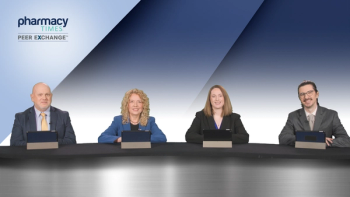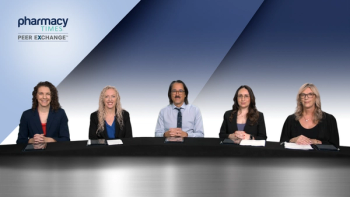
Explore the evolution of myelofibrosis treatments, from traditional therapies to groundbreaking JAK inhibitors, and the ongoing need for innovative solutions.

Explore the evolution of myelofibrosis treatments, from traditional therapies to groundbreaking JAK inhibitors, and the ongoing need for innovative solutions.

Jeffery A. Goad, PharmD, MPH, explains how recent HHS policy changes reorganizing the childhood immunization schedule could complicate routine vaccination practices and increase the risk of gaps in pediatric disease prevention.

Zahra Mahmoudjafari, PharmD, MBA, BCOP, FHOPA, highlights the EPCORE FL-1 trial, which showed that adding epcoritamab to rituximab and lenalidomide improved response rates and reduced progression risk in patients with relapsed or refractory follicular lymphoma.

Pharmacists enhance community health through outreach programs, offering vaccinations, health screenings, and education to improve access and trust in health care.

This final segment consists of expert clinicians offering key takeaways to help pharmacists prepare for potential approvals and integrate new TNBC therapies into practice.

In this episode, the panel explains how structured assessments such as the Abnormal Involuntary Movement Scale are essential tools for identifying tardive dyskinesia and distinguishing it from other drug-induced movement disorders.

Explore the latest advancements in bleeding disorder treatments, including factor replacement therapies and innovative rebalancing agents for improved patient care.

In this episode, the panel focuses on how enhancing patient and clinician education can improve early recognition of tardive dyskinesia.

This segment summarizes early DB-1305 data showing promising efficacy and manageable toxicity in pretreated TNBC, along with ongoing investigation of combination strategies such as anti-PD-L1 × VEGF bispecific therapy.

Explore the profound impact of hemophilia on patients' lives and the health care system, highlighting the essential role of pharmacists in care management.

Morgan McSweeney, PhD, discusses why current US advisory structures are vulnerable to political influence, the vital role pharmacists play in sustaining vaccine confidence, and why universal hepatitis B vaccination remains essential in the US.

Psychiatric pharmacists enhance substance use disorder (SUD) care through interdisciplinary collaboration, advocating for policy changes to improve patient outcomes and access to treatment.

Discover the innovative dadepotamab deruxtecan, an antibody-drug conjugate offering new hope for EGFR mutant lung cancer patients.

Explore the long-term effects of myelofibrosis and the importance of early diagnosis and treatment for better patient outcomes.

Morgan McSweeney, PhD, discusses the evidence behind the hepatitis B vaccine’s safety, how pharmacists can communicate with concerned parents, and the impact of shifting federal guidance on vaccine confidence.

Explore the critical role of patient characteristics and biomarker testing in managing myelofibrosis, enhancing prognosis and treatment strategies.

Discover the latest insights on amivantamab's efficacy in non-small cell lung cancer and its impact on treatment guidelines and patient outcomes.

Psychiatric pharmacists enhance opioid use disorder treatment through innovative protocols, collaboration, and education.

Psychiatric pharmacists enhance substance use disorder (SUD) care by managing medications and treatment strategies.

Expert highlights the critical need to manage skin toxicities in oncology, ensuring effective cancer treatments while addressing patient well-being and adherence.

If datopotamab deruxtecan (Dato-DXd) is approved for first-line metastatic TNBC, it could significantly influence clinical practice by providing an effective option for patients, particularly those ineligible for immunotherapy or with PD-L1–negative disease.

Pharmacists play a critical role in educating patients about potential side effects, monitoring for early signs of toxicity, and coordinating supportive care measures, including growth factor support for hematologic events.

New findings on nodal radiation for breast cancer patients highlight the importance of lymph node involvement and tumor size in treatment decisions.

The FLEX study enhances breast cancer treatment by integrating genomic data, guiding therapy choices, and improving patient outcomes.

Studying antibody–drug conjugates (ADCs) in patients ineligible for immunotherapy addresses a critical unmet need in PD-L1–negative metastatic TNBC, where targeted treatment options are limited.

If sacituzumab govitecan (SG) is approved for first-line metastatic TNBC, it could meaningfully shift clinical practice by providing an effective option for patients ineligible for immunotherapy or with PD-L1–negative disease.

Explore the complexities of hemophilia, its severity spectrum, and the emotional impact on patients and families in this insightful discussion.

Explore the latest FDA-approved therapies for non-small cell lung cancer, focusing on EGFR mutations and treatment strategies in oncology.

In the final segment, the panelists bring together the major insights from across the series, highlighting the most clinically meaningful data from monarchE, NATALEE, and VIKTORIA-1 and what these findings mean for the evolving role of CDK4/6 inhibitors in both early-stage and metastatic HR+ breast cancer.

Health care professionals discuss the risks of tardive dyskinesia in patients on dopamine receptor antagonists and emphasize the importance of education and monitoring.